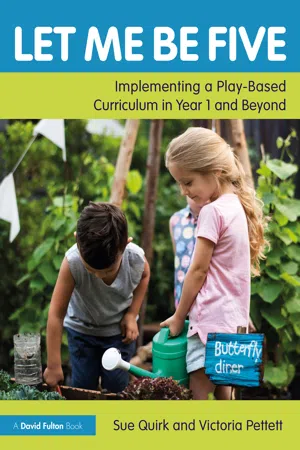
Let Me Be Five
Implementing a Play-Based Curriculum in Year 1 and Beyond
- 128 pages
- English
- ePUB (mobile friendly)
- Available on iOS & Android
About This Book
This book offers a step-by-step guide to implementing a play-based curriculum in Year 1 while fully achieving the National Curriculum objectives. The authors explore the key barriers and common pitfalls that often arise around this crucial transition, and show teachers how to successfully lead children from the Reception stage through Year 1 and to the subject-based teaching beyond. Providing practical advice and guidance for busy teachers, the authors clearly and concisely illustrate their methods with theory, personal stories and colourful photographs from transitional stories they have been a part of. Let Me Be Five shows teachers how to plan the curriculum in a way that builds on children's experiences in the Early Years Foundation Stage and gives them meaningful contexts for learning. Including real-life case studies and views from parents and teachers, this book will give you the knowledge and confidence to plan a play-based curriculum, based on children's interests and developmental needs that will enable every learner to thrive.
Frequently asked questions
Information
| 1 | How it all began |
Many failing schools are those in challenging circumstances with a high proportion of disadvantaged children. With the youngest children we have one opportunity to get it right in developing positive attitudes to future learning – it’s much harder to turn it round later.A play-based curriculum based on children’s interests will appeal to a diverse set of needs. It has to start with planning experiences that will promote curiosity, active learning, co-operation and engagement and so foster a love of learning – if these are not in place by the time a child has finished the Early Years Foundation Stage, there will be huge gaps which are difficult to fill later. Good Early Years provision gives a level playing field where all children can access learning experiences which appeal to them.However, high-quality Early Years provision needs investment – not just of excellent resources, indoors and outside, but also people. Poor subject knowledge at any stage is a barrier to children thriving. It’s important to put strong teachers and teaching assistants in Reception and to continue to provide high-quality continuing professional development for all adults, so all early years practitioners have a deep understanding of pedagogy and how children grow and develop.(Mike Wilson, interview, 2020)
Getting it right for the youngest children
Where we differ from many Trusts is that we seek to help support individual schools to grow and develop their own good practice. A key feature of our work is the mentoring and development of leadership teams to enable them to focus and act upon things effectively and at the right time. We develop existing teams of teachers and support staff through high-quality professional development. It is noticeable that in all of the schools we have developed, the majority of the staff who were present when the school fell into crisis are still there at the point when the school emerges from its difficulties. This only occurs when the organisation values the individual and recognises that competence is often relative to the level of high-quality professional development received and acted upon.(Swale Academies Trust website, 2019)
Table of contents
- Cover
- Half Title
- Endorsement Page
- Title Page
- Copyright Page
- Dedication
- Table of Contents
- List of Figures
- Preface
- Acknowledgments
- Introduction
- Chapter 1: How it all began
- Chapter 2: Rationale for change
- Chapter 3: Enabling environments
- Chapter 4: Putting ideas into practice
- Chapter 5: Barriers to implementation
- Chapter 6: Transitions
- Chapter 7: Moving forward – Year 1 and beyond
- Afterword
- Index